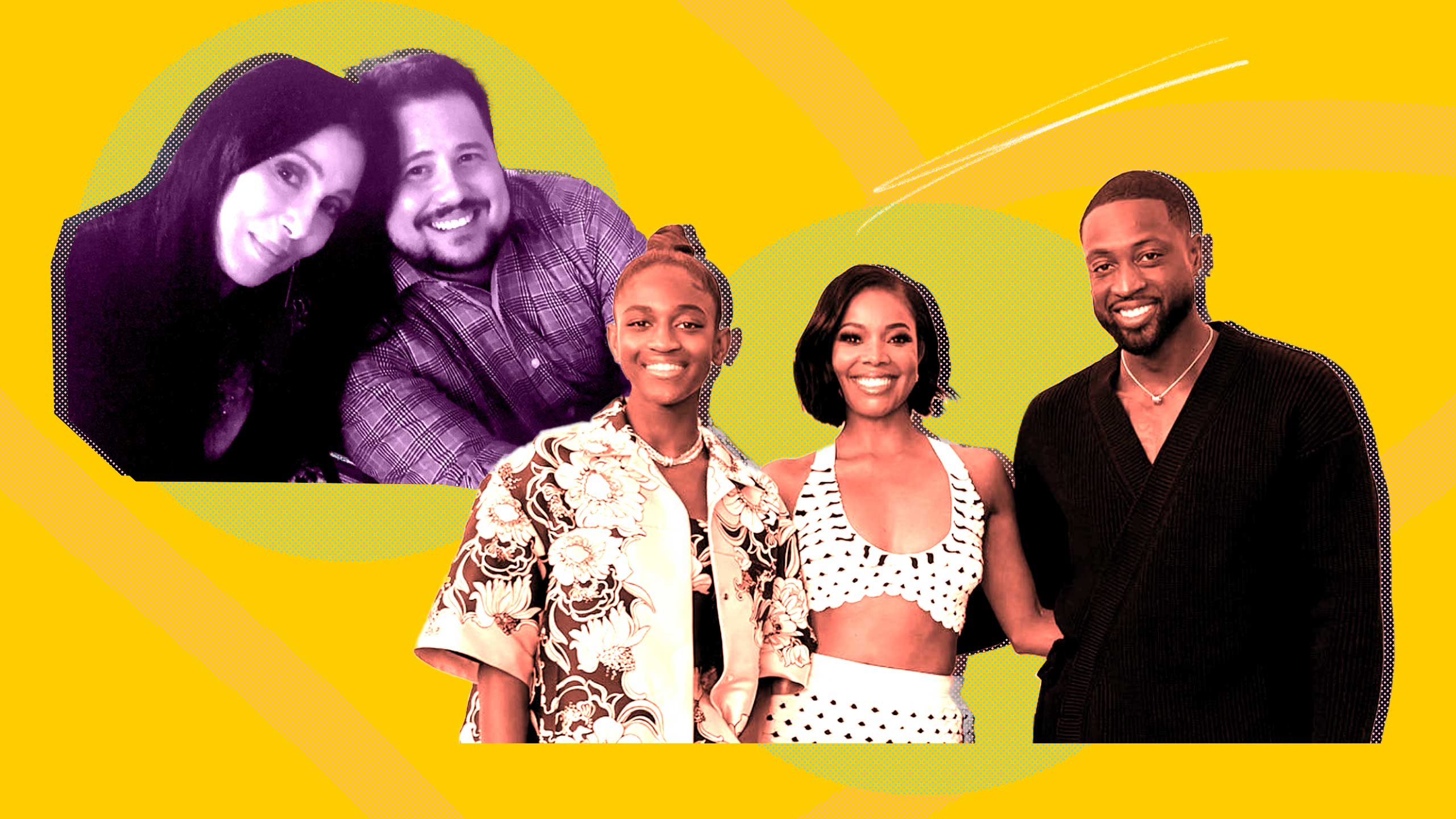Once upon a time, celebrities simply did not talk about trans people—let alone anyone they knew personally. But the past few years have seen an uptick in a specific kind of celebrity: the proud parents of trans children using their platforms to shine a light on trans families.
In the last month alone, Jamie Lee Curtis explained on Jimmy Kimmel Live! that she’ll be cosplaying to officiate her trans daughter’s wedding; Gabrielle Union told BuzzFeed about the importance of loving her trans step-daughter Zaya “out loud”; and Colin Mochrie won $100,000 for Rainbow Camp, an LGBTQ2S+ charity that has a special place in his heart due to his trans daughter.
That’s a stark difference from 2009, when Cher’s son Chaz Bono came out publicly as a trans man, and in doing so became one of the only trans people in pop culture who was famous pre- and post-transition.
But Cher admitted she initially found Chaz’s transition difficult. In a 2011 interview with ABC, Cher said “I have two sons,” while also repeatedly using the wrong pronouns for Chaz and claiming his gender-affirming surgery team “didn’t make the bechmarks that I thought would be necessary.” By 2012, she was more settled, calling her son “the most courageous person I know.”
A decade later, she has had time to reflect on her mistakes: “I didn’t handle [Chaz’s transition] all that well in the beginning,” she said in 2020. “It took me a minute.”
For many parents of trans kids, Cher was the only reference point they had for a long time.
“Cher was it,” says trans parenting advocate Vanessa Nichols, whose son came out in 2018 at age seven, when they lived in Florida. Chaz came out when he was 40, which felt a world away from her young son. “That was really my benchmark of, ‘Well, this mom did it.’”
Jenn Hoppe, who lives in Virginia, says her son came out as transgender in June 2019, at age 11. She points to Cher as an example of one sort of story: a parent who initially struggled to accept their trans child but ultimately realized their mistake—and one who can be viewed as a warning to others not to act the same way.
“I think what’s been great about [Cher] is that she … was very open about, like, ‘I screwed up. When my son came out to me, I screwed up, I didn’t believe him, I struggled with it,’” Hoppe said. “Her modelling that, and saying ‘I was wrong, thank goodness I didn’t permanently damage my relationship with Chaz’ … She’s been talking about it for so long. Cher’s awesome.”
Although there were a number of high-profile trans celebrities by the late 2010s, several years after TIME declared 2014 “the transgender tipping point,” supportive families still seemed few and far between.
Jazz Jennings, who first came to public attention in 2007 in a 20/20 interview (with her parents) as a trans child and has been in the public eye ever since, was a rare exception.
In a 2021 Variety cover story, Nick Adams, GLAAD’s director of transgender representation, explained Jennings’ impact. “Seeing [the] interview with Jazz and her family, in which Jazz was a happy, well-adjusted child, allowed so many other families to understand how to love and support their own trans children.”
But one story was never going to reach everyone. Nichols says she had heard of Jennings’ reality show, I Am Jazz, but “didn’t put much thought to it.” The show covers Jennings’ life growing up as a transgender teen in Florida, and also shows her parents and brothers supporting her.
But Jennings was also famous for being trans. Of course her parents were supportive if they were taking her to interviews and trying to help with her advocacy. Celebrities who are famous for other things—acting, comedy, sports—who then speak up about supporting their trans kids seem, weirdly, more relatable. They’re just (famous) parents, who may not have experience with trans issues, but are learning about it the way any other parent of a trans kid might.
Having more celebrity voices out there means there’s more chance of one of those stories getting through to people who need to hear it. And there’s also more room for different kinds of stories to be told.
Hoppe says that celebrity parents can do a great job of showing the beauty of trans joy.
“A kid coming out is like, you see how much happier they are and how much joy there is and how much positivity there is. I think celebrities are quite well positioned to talk about that in particular, because they can be on the cover of People Magazine with their beautiful smiling child,” she says.
Jamie Lee Curtis is a prime example of this—there are literally photos of her and her daughter Ruby beaming in People magazine from a 2021 interview where Ruby came out publicly for the first time. In the interview, Curtis is open about still learning “new terminology and words” and trying “to avoid making big mistakes.”
“I’m learning so much from Ruby. The conversation is ongoing. But I want to know: How can I do this better?” Curtis told People.
For Massachusetts-based mom Nancy, who asked that her last name be omitted, celebrities with trans kids can provide a valuable lesson to all parents: the importance of listening to your children and allowing them to lead.
“Don’t be afraid to listen to your kids. They’re smarter than you give them credit for,” she tells Xtra. Nancy’s son, who is now 31, came out as trans around 12 years ago. “They understand a lot more than you think.”
However, Nancy is also skeptical as to the extent that supportive celebrity parents can help change minds.
She says that while “it’s nice for me as the parent of a transgender child to be able to see others who support their kids,” she wonders how much impact it has in counteracting active transphobia.
“In my experience, the ones who are not supportive, the ones who have the biggest problem [with trans people] are conservatives,” she says. “I don’t know how much it really does to change minds, because I’m not sure they’re open to hearing.”
But there’s more to support than just PR work. As attacks on trans rights gather steam across the U.S. especially, some celebrity parents are taking a stand to draw attention to political issues. In an Instagram post, Jamie Lee Curtis denounced anti-trans policies as “discriminatory, unjust and anti-American.” On Twitter, Gabrielle Union responded to Texas’ decision to classify gender-affirming care for minors as child abuse with an impassioned call to action: “The rubber has hit the road so who is standing shoulder to shoulder in this fight? Who truly gives a sh*t and whose [sic] on that performative bs?”
Trans people, like other marginalized groups, have long been an internet punching bag. When comedian Colin Mochrie posted a sweet photo of himself, his wife and his trans daughter Kinley online in 2018, he received plenty of support—and vitriol. “Thanks to the fans of this page for being supportive and human. To the trolls, my thoughts and prayers to your body for losing it’s [sic] mind and soul so tragically,” he wrote.
Having celebrity allies in general standing up for trans rights is always appreciated, but there’s something especially meaningful when it comes from parents being vocally supportive.
A 2016 study into family acceptance and suicide risk found that most trans people experienced at least a low amount of family rejection. Seeing celebrity parents supporting trans children can be a reminder that supportive families do exist—and there are people who love their children regardless.
Nichols points out that support is extra effective when it comes from celebrities in less traditionally accepting spheres like athletics, as it shows trans kids that all kinds of parents can be supportive—and it helps parents consider how they may react to the possibility that their child could be trans.
“Dwyane Wade, as a person of colour, in a cis-male dominated space like basketball, for him to say, ‘This is what I’m doing,’ [supporting daughter Zaya]—there is one child, as least, that feels that and that says, ‘Maybe I can talk to my parents about this,’” Nichols says. “And there’s one parent at least, if not millions, saying, ‘Hmm, I never thought that I might have a trans child, maybe I should think about this.’ … I wish someone would have said that to me.”
As trans people continue to become visible and demonstrate that being trans is something beautiful and powerful and worthy of love, people who love trans people become more visible, too. Having a trans child is not shameful—it’s something to be celebrated.
“It’s just such a blessing to have a kid that is becoming themselves. And that’s what parenting is all about,” Hoppe says. “Parents out there who have a platform and who are modeling it are doing a real service to the trans parenting community.”
Correction: March 31, 2022 4:07 pmThe original version of this story misspelled the name of Dwyane Wade.


 Why you can trust Xtra
Why you can trust Xtra


